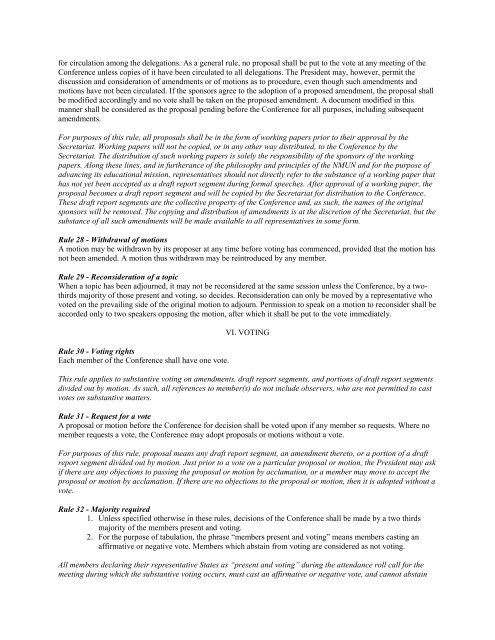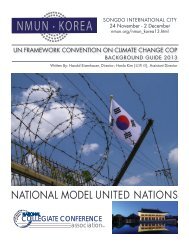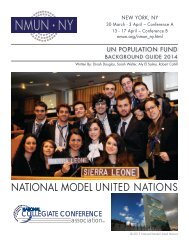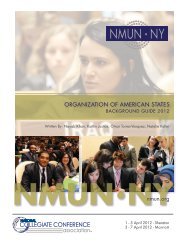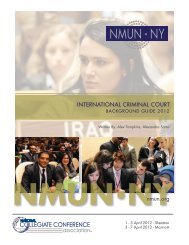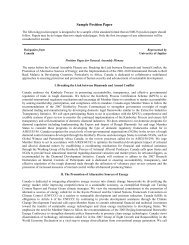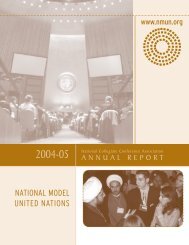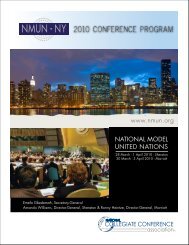UNCTAD Background Guide - National Model United Nations
UNCTAD Background Guide - National Model United Nations
UNCTAD Background Guide - National Model United Nations
Create successful ePaper yourself
Turn your PDF publications into a flip-book with our unique Google optimized e-Paper software.
for circulation among the delegations. As a general rule, no proposal shall be put to the vote at any meeting of the<br />
Conference unless copies of it have been circulated to all delegations. The President may, however, permit the<br />
discussion and consideration of amendments or of motions as to procedure, even though such amendments and<br />
motions have not been circulated. If the sponsors agree to the adoption of a proposed amendment, the proposal shall<br />
be modified accordingly and no vote shall be taken on the proposed amendment. A document modified in this<br />
manner shall be considered as the proposal pending before the Conference for all purposes, including subsequent<br />
amendments.<br />
For purposes of this rule, all proposals shall be in the form of working papers prior to their approval by the<br />
Secretariat. Working papers will not be copied, or in any other way distributed, to the Conference by the<br />
Secretariat. The distribution of such working papers is solely the responsibility of the sponsors of the working<br />
papers. Along these lines, and in furtherance of the philosophy and principles of the NMUN and for the purpose of<br />
advancing its educational mission, representatives should not directly refer to the substance of a working paper that<br />
has not yet been accepted as a draft report segment during formal speeches. After approval of a working paper, the<br />
proposal becomes a draft report segment and will be copied by the Secretariat for distribution to the Conference.<br />
These draft report segments are the collective property of the Conference and, as such, the names of the original<br />
sponsors will be removed. The copying and distribution of amendments is at the discretion of the Secretariat, but the<br />
substance of all such amendments will be made available to all representatives in some form.<br />
Rule 28 - Withdrawal of motions<br />
A motion may be withdrawn by its proposer at any time before voting has commenced, provided that the motion has<br />
not been amended. A motion thus withdrawn may be reintroduced by any member.<br />
Rule 29 - Reconsideration of a topic<br />
When a topic has been adjourned, it may not be reconsidered at the same session unless the Conference, by a twothirds<br />
majority of those present and voting, so decides. Reconsideration can only be moved by a representative who<br />
voted on the prevailing side of the original motion to adjourn. Permission to speak on a motion to reconsider shall be<br />
accorded only to two speakers opposing the motion, after which it shall be put to the vote immediately.<br />
Rule 30 - Voting rights<br />
Each member of the Conference shall have one vote.<br />
VI. VOTING<br />
This rule applies to substantive voting on amendments, draft report segments, and portions of draft report segments<br />
divided out by motion. As such, all references to member(s) do not include observers, who are not permitted to cast<br />
votes on substantive matters.<br />
Rule 31 - Request for a vote<br />
A proposal or motion before the Conference for decision shall be voted upon if any member so requests. Where no<br />
member requests a vote, the Conference may adopt proposals or motions without a vote.<br />
For purposes of this rule, proposal means any draft report segment, an amendment thereto, or a portion of a draft<br />
report segment divided out by motion. Just prior to a vote on a particular proposal or motion, the President may ask<br />
if there are any objections to passing the proposal or motion by acclamation, or a member may move to accept the<br />
proposal or motion by acclamation. If there are no objections to the proposal or motion, then it is adopted without a<br />
vote.<br />
Rule 32 - Majority required<br />
1. Unless specified otherwise in these rules, decisions of the Conference shall be made by a two thirds<br />
majority of the members present and voting.<br />
2. For the purpose of tabulation, the phrase “members present and voting” means members casting an<br />
affirmative or negative vote. Members which abstain from voting are considered as not voting.<br />
All members declaring their representative States as “present and voting” during the attendance roll call for the<br />
meeting during which the substantive voting occurs, must cast an affirmative or negative vote, and cannot abstain


